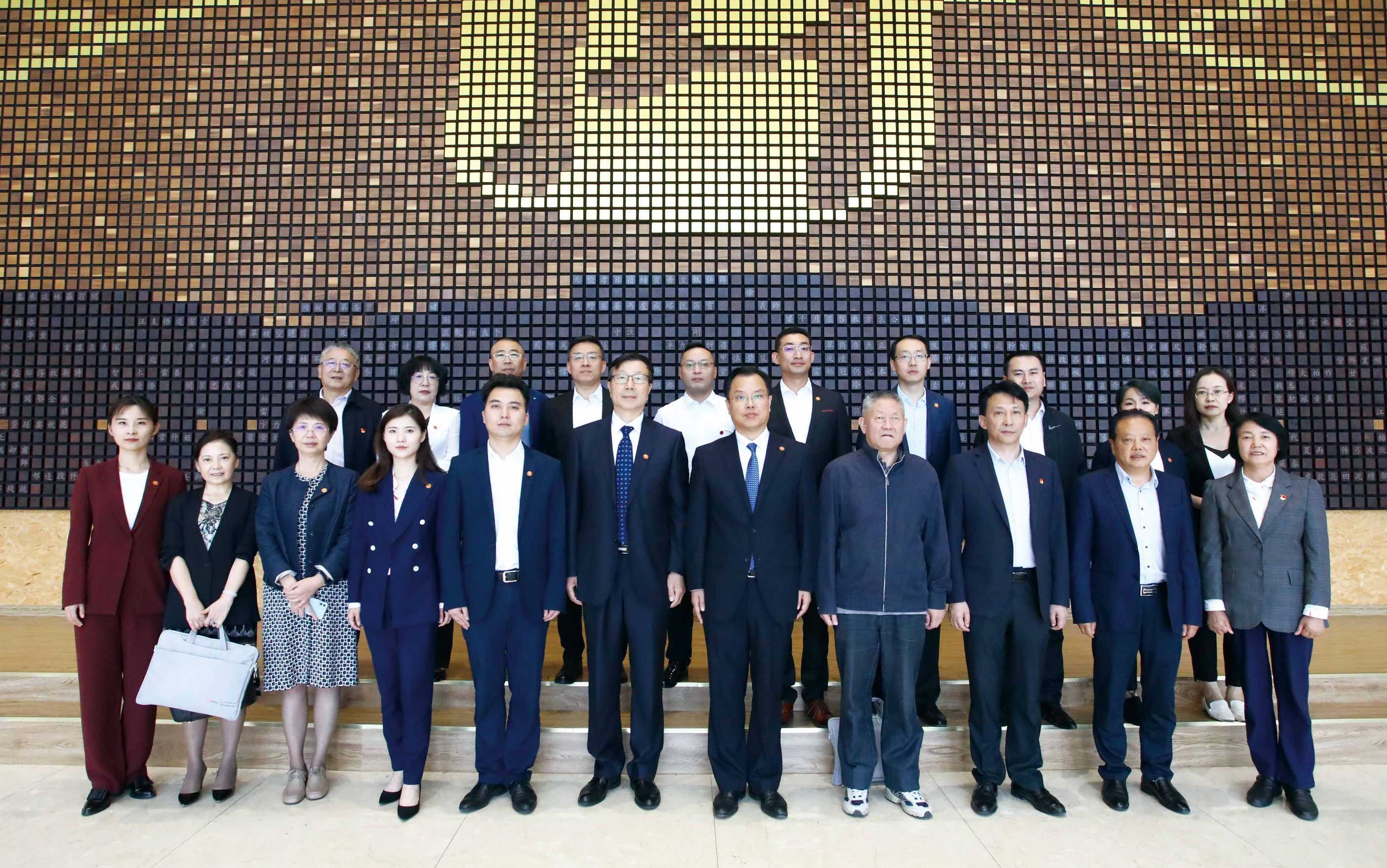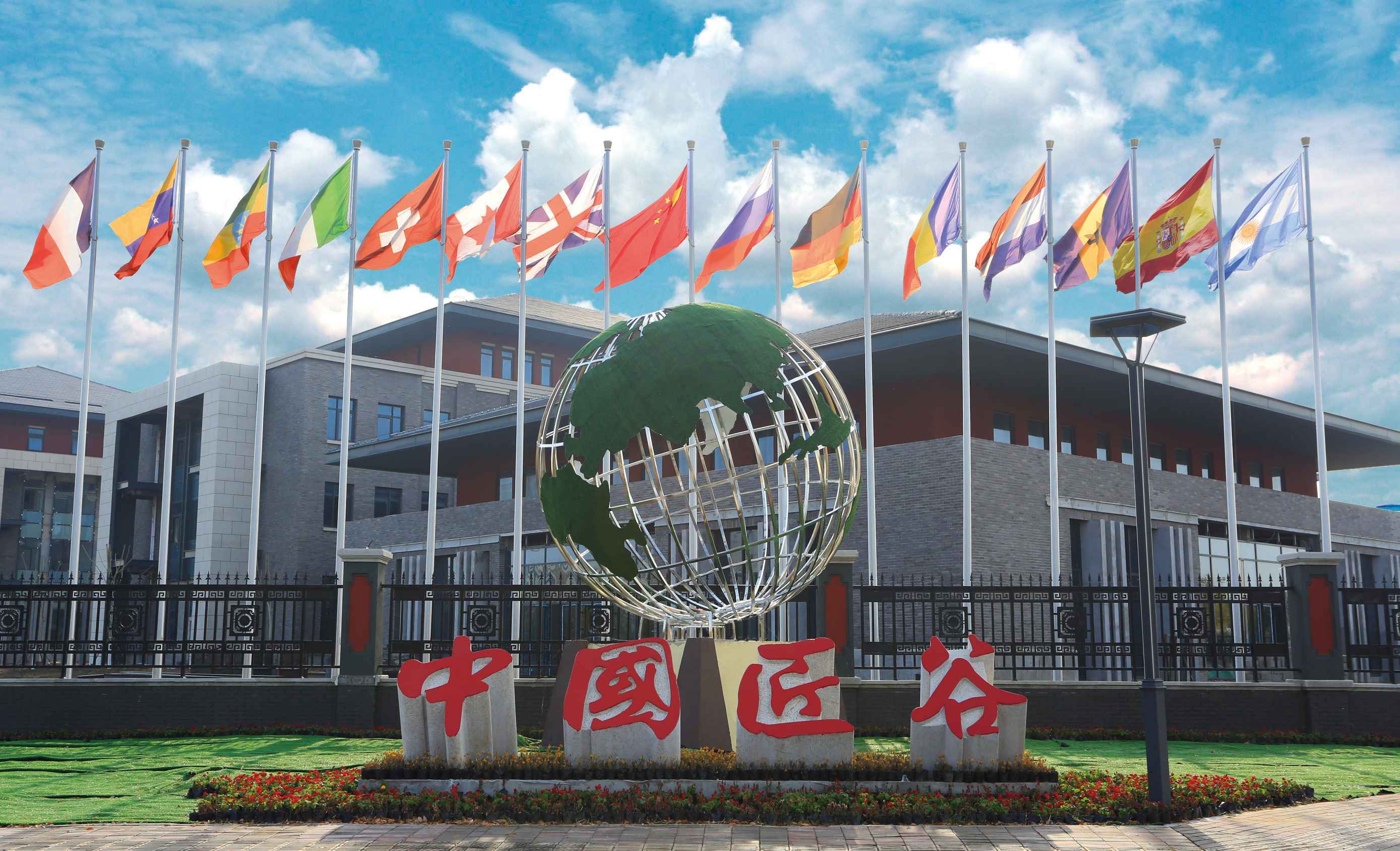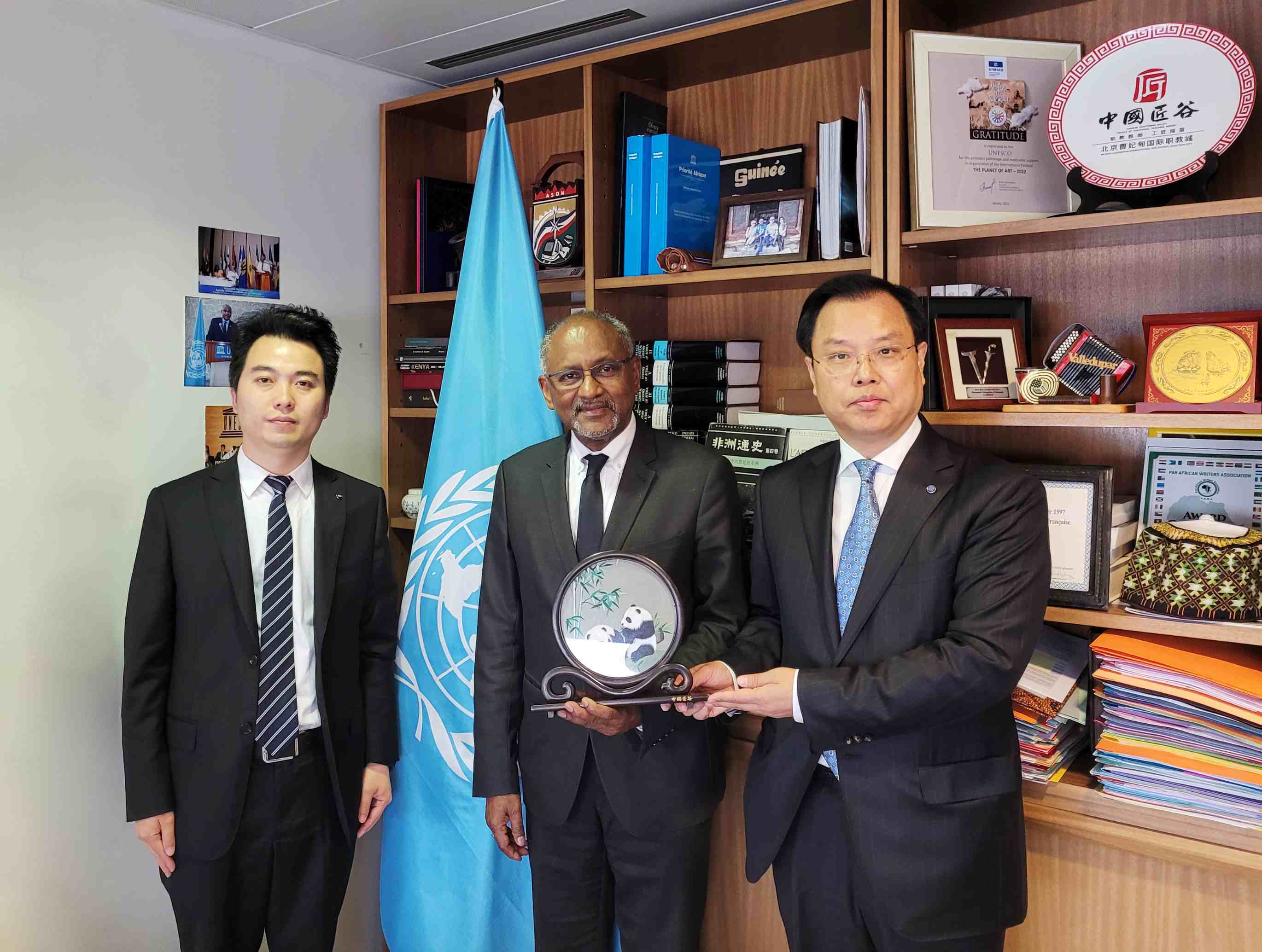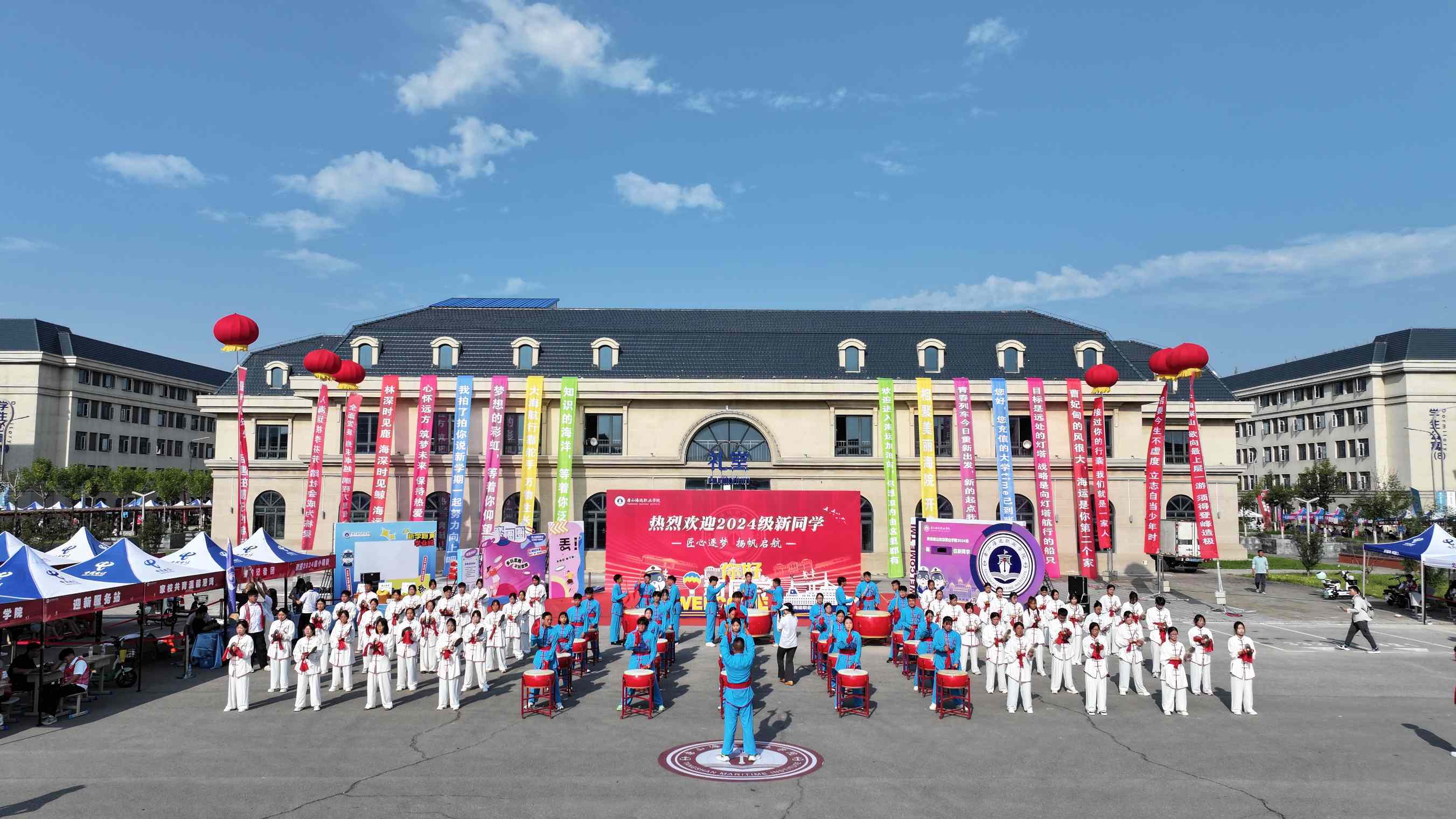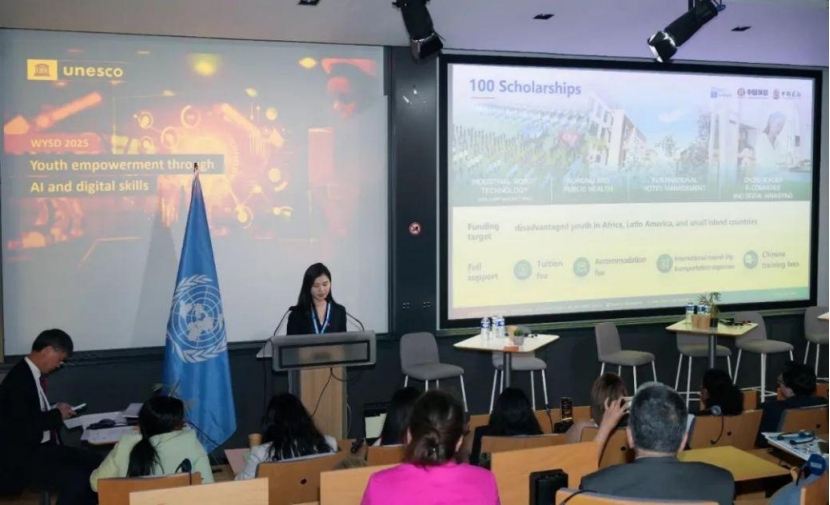2025 High-Level Policy Dialogue in East Asia Successfully Held
Release time:Jul 02,2025
On June 30, 2025, the 2025 High-Level Policy Dialogue in East Asia concluded successfully in Ulaanbaatar, Mongolia. Convened under the theme "Fostering an AI-enabled Higher Education Ecosystem," the dialogue was co-organised by the Ministry of Education of Mongolia, the Ministry of Digital Development, Innovation and Communications of Mongolia, the Mongolian National Commission for UNESCO (MNCU), the Mongolian University of Science and Technology (MUST, IIOE Mongolia National Centre), the UNESCO Regional Office for East Asia, and the International Centre for Higher Education Innovation under the auspices of UNESCO (UNESCO-ICHEI), with the support of China Pocy Group Co., Ltd. The high-level gathering drew over 150 participation from government officials across the East Asian region, higher education institution leaders, UNESCO representatives, regional and international organisation delegates, academics, industry experts, and corporate representatives. The discussions focused on the opportunities and challenges that artificial intelligence (AI) brings to higher education systems in the region, analysed concrete needs and implementation difficulties, showcased feasible AI application solutions for higher education, and promoted collaboration among academia, industry, research institutions, and multilateral partners.

Group Photo of Policy Dialogue Participants
The policy dialogue aimed to build a regional collaborative ecosystem, with a focus on exploring policy directions and solutions for AI integration in higher education. It featured four core sessions covering key areas: "Policy and Governance on AI Integration in Higher Education", "Enhancement of AI Proficiency in the Higher Education Workforce", "Industry-Academia Cooperation and Innovative Partnerships", "Advancing Learning and Innovation in Technical and Vocational Education and Training (TVET)". Participants engaged in in-depth discussions on the opportunities and challenges brought by AI technologies, new models of industry-education integration, innovative development of vocational education, and multilateral partnerships.
During the meeting, the IIOE Mongolia National Centre and UNESCO-ICHEI officially lauched their joint action plan on Capacity-Building and Recognition of Digital and AI Competencies in Mongolia's Higher Education Sector, aiming to further enhance the digital competencies of university faculty in Mongolia and increase recognition of the IIOE Micro-Certification Project. The event also facilitated the establishment of a policy dialogue and exchange mechanism among diverse stakeholders in East Asia, encouraging enterprises and educational institutions in the region to showcase AI application cases in the higher education sector. This initiative aims to strengthen corporate engagement and partnerships, promote industry-academia collaboration, and provide a multilateral cooperation platform for educational innovation in the AI era. The meeting marked the official release of the regional report Digital Leap in East Asia: A Regional Synthesis on Higher Education Transformation, jointly curated by the UNESCO Regional Office for East Asia and UNESCO-ICHEI. This publication provides theoretical frameworks and practical guidance for institutions pursuing digital transformation across the region.
Opening Remarks
On the morning of 30 June, the Policy Dialogue was opened by Ms. URANGAA Erdenee, Education Specialist of Mongolian National Commission for UNESCO.
Mr. ZOLJARGAL Jargalsaikhan, Member of the State Great Hural and Head of the Standing Committee on Innovation and Digital Policy of the Parliament of Mongolia said in his opening speech that the conference would focus on the core theme of "Fostering an AI-Enabled Higher Education Ecosystem" and called for sharing of practical experiences and joint development of action plans in line with UNESCO's Higher Education Roadmap 2030 and the United Nations Sustainable Development Goal 4. Therefore, AI technology becomes a tool for empowering education, promoting equity and stimulating innovation.
Mr. GANTULGA Donorov, Advisor to Minister of Education of Mongolia, emphasised the urgent need to establish an ethical framework for AI to regulate its use. In this regard, he suggested that AI should complement, not replace, teachers; schools should build students' capacity to use AI responsibly and strictly protect the security of students' data to help teachers use AI confidently and responsibly.
In a video message, Prof. KHAN Shahbaz, Director of UNESCO Regional Office for East Asia said that the theme of the meeting is highly in line with UNESCO's mission. Noting that East Asia faces unique challenges such as uneven technological development, he said that there is an urgent need for governments, academia and industry to strengthen regional dialogue and develop policies that are relevant to East Asia, and called for the creation of a future in which AI-driven innovations and human-centred values coexist.
Prof. NAMNAN Tumurpurev, President of Mongolian University of Science and Technology (MUST) introduced that through deep cooperation with UNESCO-ICHEI, MUST has successfully landed benchmark projects such as Smart Classroom project and capacity building on blended teaching and learning, which have made significant contributions to accelerating the digital transformation of higher education in Mongolia.
Prof. JIN Li, Director of UNESCO-ICHEI and Vice President of Southern University of Science and Technology (SUSTech), pointed out that East Asia is a global leader in the transformation of AI higher education, and that its well-established national strategies, sound governance frameworks, and public-private partnership models have effectively promoted digital infrastructure and talent development. In particular, the International Institute of Online Education (IIOE) has been working closely with its partners to actively promote the development of an AI higher education ecosystem in East Asia and globally. He said the policy dialogue would provide valuable inputs and references for regional experience sharing and international higher education innovation.
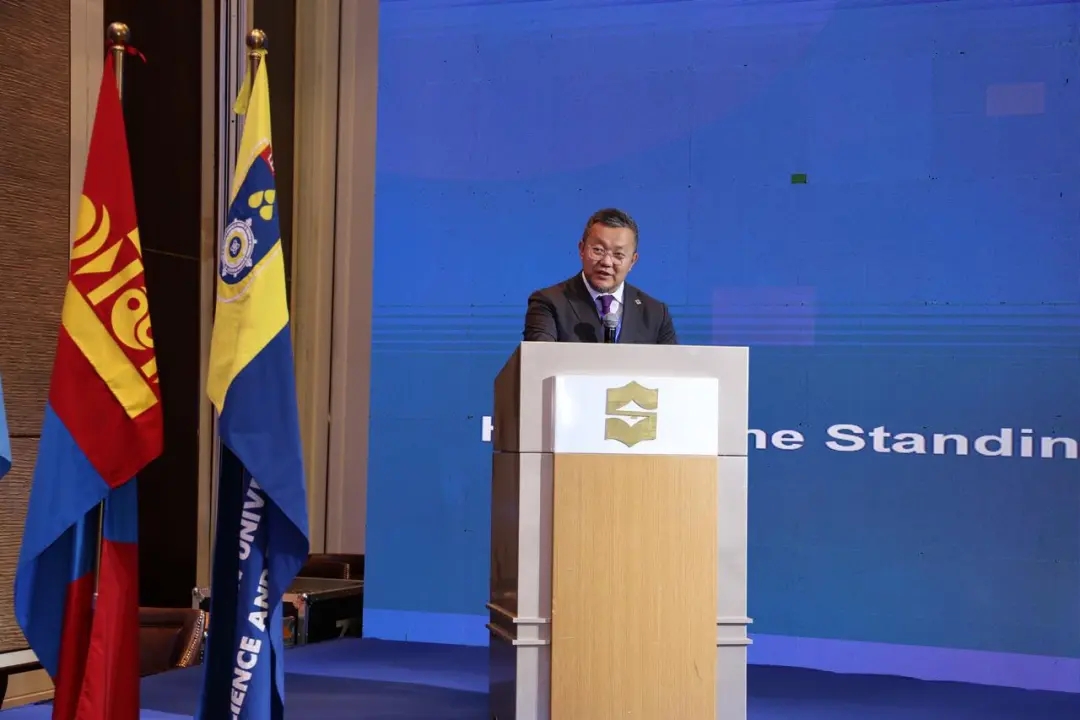
Mr. ZOLJARGAL Jargalsaikhan, Member of the State Great Hural, Head of the Standing Committee on Innovation and Digital Policy of the Parliament, Mongolia
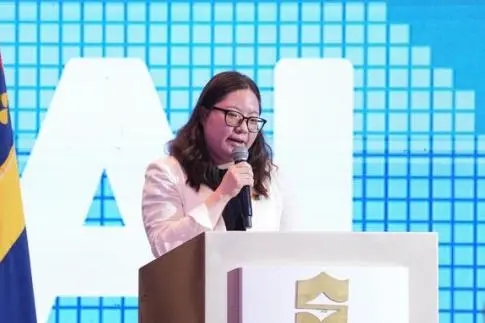
Ms. URANGAA Erdenee, Education Specialist of Mongolian National Commission for UNESCO
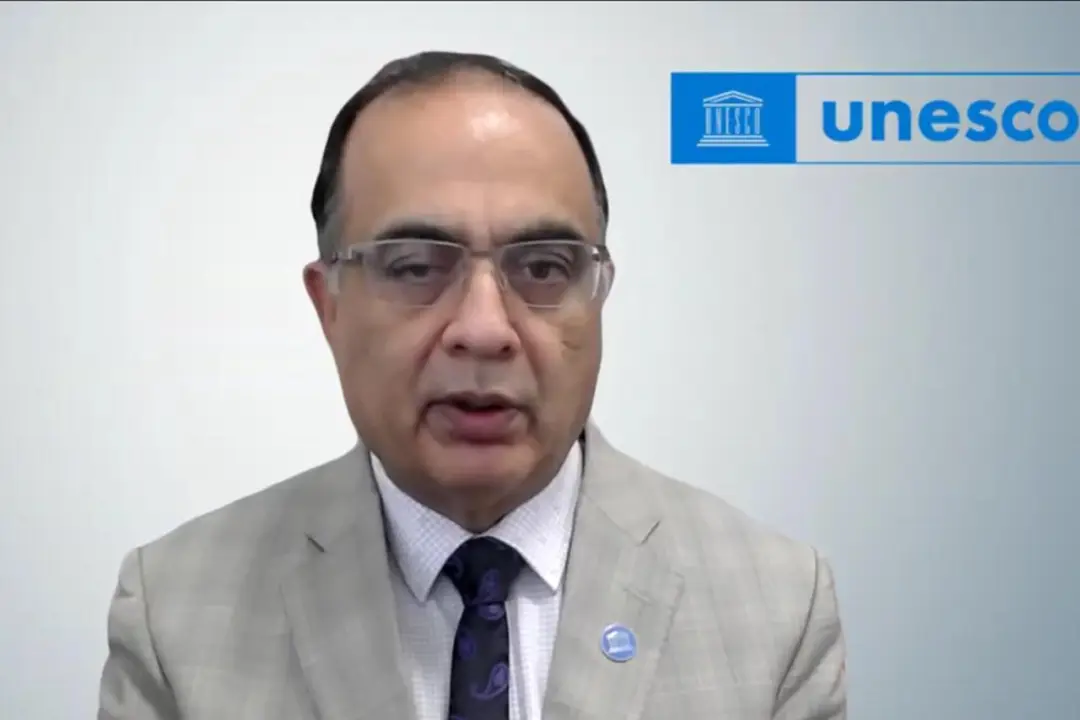
Prof. KHAN Shahbaz, Director, UNESCO Regional Office for East Asia
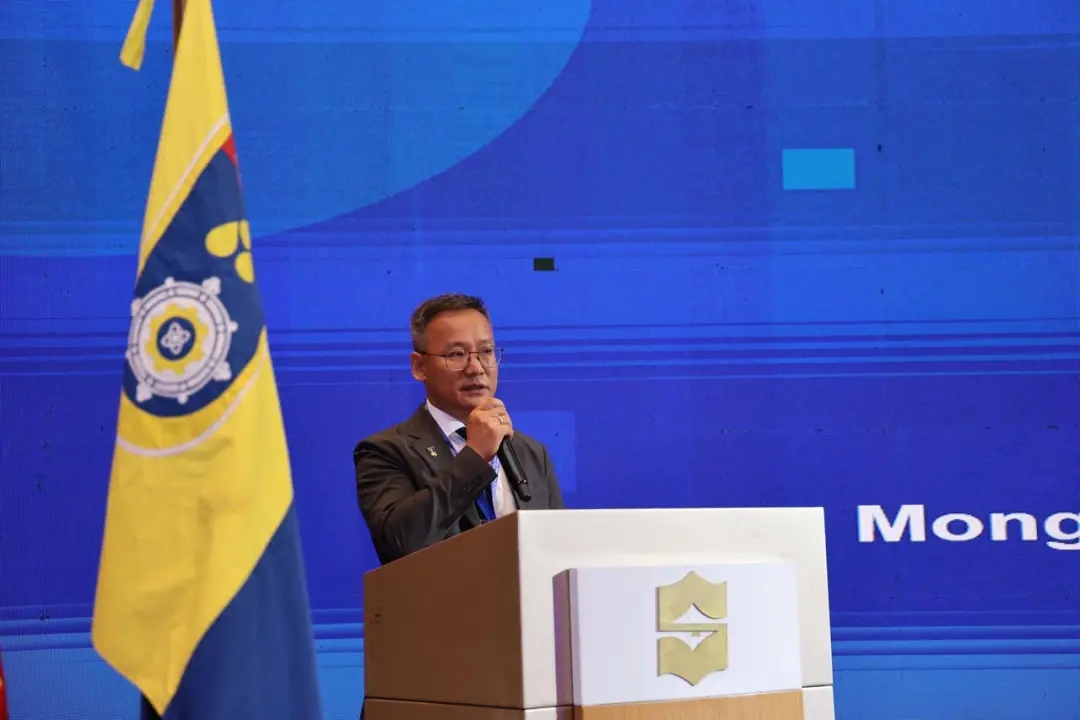
Prof. NAMNAN Tumurpurev, President, MUST
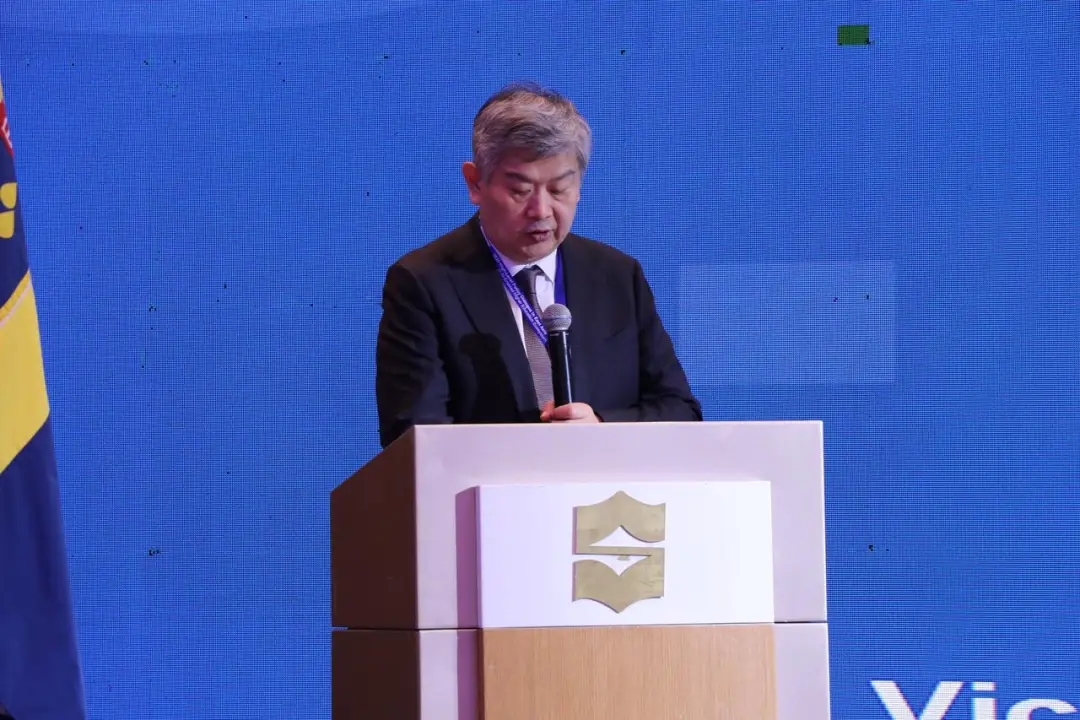
Prof. JIN Li, Director of UNESCO-ICHEI and Vice President of SUSTech
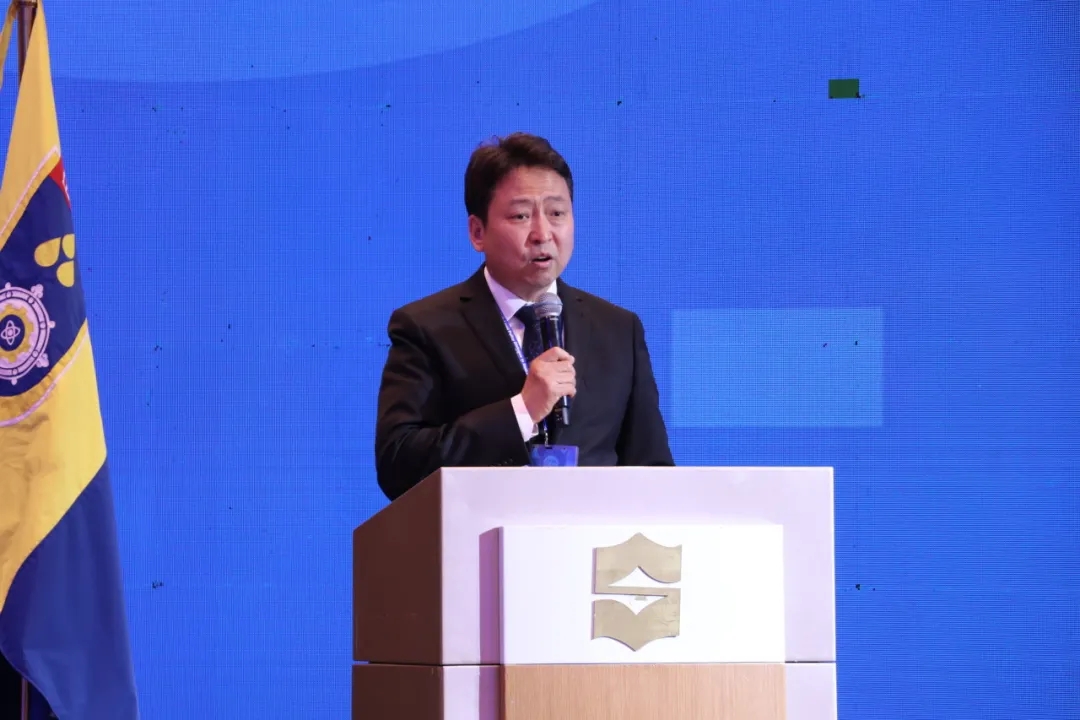
Mr. GANTULGA Donorov, Advisor to Minister of Education, Mongolia
Keynote Speech
Mr. BADRAL Sanlig, Founder of Chimege Systems LLC, a Mongolian AI startup, pointed out that AI is transforming a global education system both by delivering personalised learning that transcends geographic boundaries, but also by posing significant challenges such as a crisis of authenticity, weakened human relationships and regulatory challenges. To this end, Mr. Badral advocates for countries to establish national AI education working groups to drive a fundamental shift from traditional factory-based education to dynamic community-based learning ecosystems that focus on emotional intelligence and human intelligence. Badral said that while AI must act as an engine of the mind, the critical balance of "culture is local, knowledge is global" should be maintained.
Professor GONG Ke, Executive Director of Chinese Institute for New Generation Artificial Intelligence Development Strategies, pointed out that AI is an important tool for promoting educational change, while education is necessary to ensure the safe development of AI. In particular, Professor GONG Ke emphasised that AI education is not just about using AI tools and imparting AI knowledge, but focuses on fostering the intelligent qualities, digital literacy and critical thinking, so as to nurture the young generation with good ethical foundations and technological capabilities required for a sustainable digital economy and society.
Mr. YAO Yizun, Chairman of the Industry-Education Integration Committee of the World Federation of UNESCO Associations and President of China Pocy Group Co. Ltd., expressed his views on youth employment and skills gap in the age of AI, pointing out that the global NEET rate (youth not in education, employment, or training) has reached 20.4%, and that, in the face of systemic challenges, it is necessary to rely on the strengths of multi-party collaboration rather than a single actor. He called for the innovation of vocational education through international cooperation and construction of an international vocational ecosystem that integrates industry and education to address the employment challenges in the AI era.
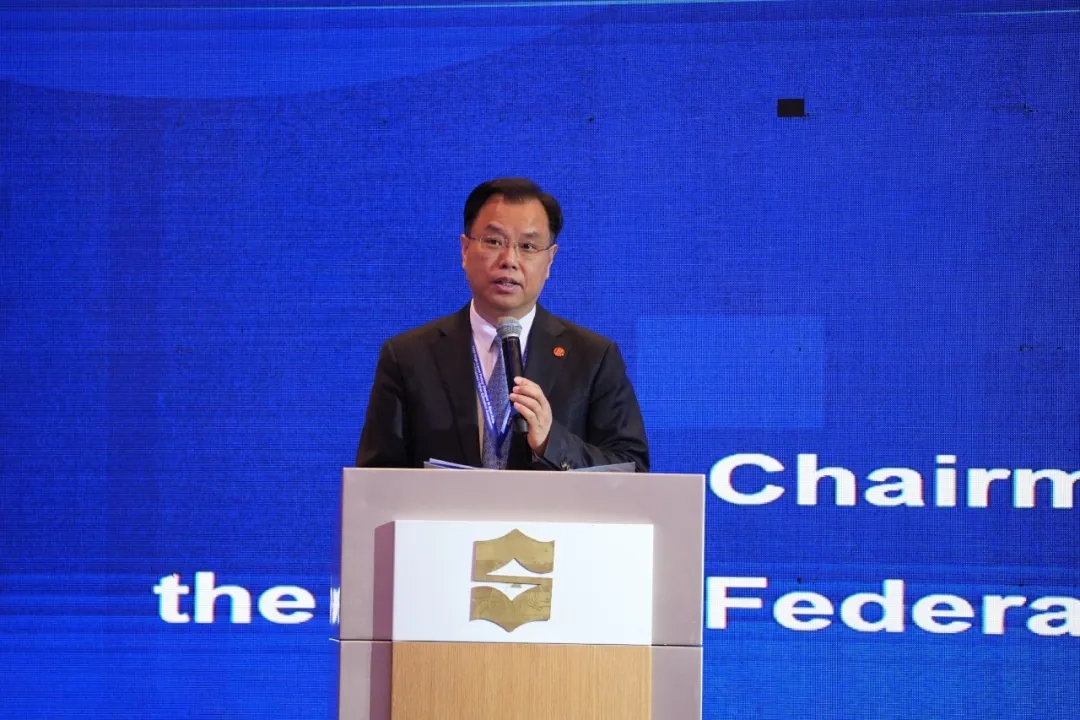
Mr. YAO Yizun, Chairman of the Industry-Education Integration Committee of the World Federation of UNESCO Associations and President of China Pocy Group Co. Ltd.
Action Plan
During the meeting, Prof. GANBAT Danaa, Director of Open Education Institute of Mongolian University of Science and Technology (MUST) introduced the joint action plan on Capacity-Building and Recognition of Digital and AI Competencies in Mongolia's Higher Education Sector, which was released by IIOE Mongolia National Centre in cooperation with UNESCO-ICHEI. Aimed at developing intermediate and advanced digital and AI skills for faculty and administrators, the plan seeks to integrate modern teaching technologies into application. The plan prioritises three strategic areas, including Digital Skills Development, AI Competency Enhancement, and Micro-Certification & Recognition. The plan will be implemented in five phases and is expected to be completed by the end of 2027, by which time the IIOE Micro-Certification Project will be recognised by higher education institutions and government departments, and a sustainable mechanism for training digital talents will be established.
To promote the sharing of best practices, the IIOE Mongolia National Centre will also organise regular events such as the Annual Digital and AI Education Summit as well as Educators' Forum on Digital Teaching Innovations to cultivate communities of practice and provide continuous momentum for the digital transformation of higher education in Mongolia.
Meeting Agenda
Policy and Governance on AI Integration in Higher Education
Session I was chaired by Mr. BOLDSAIKHAN Sambuu, Secretary-General of Mongolian National Commission for UNESCO. Mr. BAT-ULZII Batchuluun, Director of Digital Development Policy Implementation & Coordination, Ministry of Digital Development, Innovation and Communications of Mongolia, presented the current status of digital transformation in Mongolia. He noted that while the infrastructure was largely in place, the overall transformation still faced challenges. To that end, Mongolia was striving to become a key player in the global AI ecosystem by 2030 through measures such as smart governance and national AI development strategies.
Dr. LO Benny, Co-founder of AiVanse Technology Ltd. Hong Kong in China and Dean of the AI Research Institute at Brest Business School in France, shared the potential of AI-powered wearable devices to improve cognition in education and personalised services.
Mr. LIU Jimmy, Chair Professor of Department of Computer Science and Engineering in Southern University of Science and Technology, proposed "Educational Intelligence (EI)" as a new paradigm for understanding education with the help of AI algorithms, and elaborated on the innovative applications of AI algorithms in the five major areas - pedagogy theory, curriculum development, textbook content management, teaching practice, and course evaluation.
Dr. SONG Ki Sang, Professor at Department of Computer Education, Director of Center for Global Education Cooperation of Korea National University of Education in Republic of Korea, introduced Korea's policy initiatives in AI talent development, including the establishment of cross-disciplinary graduate programmes and advocacy for the integration of AI in various disciplinary fields through research grants.
Dr. OYASU Kiichi, Director of Education Cooperation Department of Asia-Pacific Cultural Centre for UNESCO in Japan, explained in detail Japan's AI and digital transformation practices from national strategies to university projects, with a special focus on student-centred education, and improving the quality of teaching and learning through public-private partnerships and technology-enabled approaches.
Enhancement of AI Proficiency
in the Higher Education Workforce
Session II was chaired by Dr. ARIUNAA Enkhtur, Associate Professor at University of Osaka in Japan.
Ms. BI Xiaohan, Deputy Director of UNESCO-ICHEI, emphasised that the rapid pace of technological change is creating an urgent need for upskilling and reskilling among higher education professionals. She highlighted how IIOE supports the development of a diversified and collaborative global education ecosystem through its systematic digital and AI competency courses and the Micro-Certification Project, which enhances educators' digital competencies worldwide.
Dr. ARIUNBOLOR Davaa, Professor at the Open Education Institute of MUST, shared Mongolia's experience in implementing the Micro-Certification Project. The initiative adopts a three-phase cascade model that enables localised course delivery and large-scale faculty training, significantly strengthening AI teaching capacities in higher education and contributing to knowledge sharing across the IIOE network.
Prof. HUANG Hua, Vice President of Nanjing Polytechnic Institute in China, presented her institution's "1-3-4" practice framework—One Collaborative Solution, Three Smart Platforms, and Four Strategic Actions. She emphasised building a solid foundation for enhancing teachers' digital literacy through the three smart education platforms, and driving the digital transformation and capacity enhancement of the teaching faculty in a systematic way. The four strategic actions—Cultivate AI Mindsets, Strengthen AI Tools, Build AI Platforms, and Embed AI Content—aim to empower educators at multiple levels with AI competencies.
Dr. FIELARDH Khalifatulloh, Specially Appointed Assistant Professor at the Faculty of Education at Okayama University in Japan, stressed the importance of providing AI literacy training to university faculty. He elaborated on the layered governance model promoted by Japan's Ministry of Education, Culture, Sports, Science and Technology (MEXT), which balances national guidance with institutional autonomy to build AI implementation pathways that are forward-looking, ethically grounded, and competency-based.
Following this, Dr. CHOI Mee Young, Chief of Education at UNESCO Beijing Office, introduced the newly released report titled Digital Leap in East Asia: A Regional Synthesis on Higher Education Transformation. The report calls on countries to place digital transformation at the heart of socio-economic development, ensure equitable access to digital resources, strengthen training in digital innovation, deepen academia–industry collaboration, and emphasise ethical considerations in AI deployment. It advocates nationally standardised systems and robust interdepartmental and international cooperation to jointly shape a more resilient and inclusive future for higher education in East Asia.
Industry-Academia Cooperation
and Innovative Partnerships
Session III was chaired by Dr. CHOI Joon Nak, Adjunct Associate Professor at Hong Kong University of Science and Technology.
Dr. LIU Dejian, Founder, Chairman of the Board, and Executive Director of NetDragon Websoft Inc., and Member of the Advisory Council of UNESCO Institute for Information Technologies in Education in China, used a digital avatar to present four core collaboration models between industry and higher education institutions developed by NetDragon in cooperation with universities worldwide. He emphasised the strategic roles that enterprises play in such collaborations to promote the integration of artificial intelligence into higher education, and called on global partners to deepen these innovative partnerships.
Professor Badarch Dendev, former President of the National University of Mongolia, stressed that collaboration between industry and academia should not only focus on providing content and resources but also prioritise human development and the transformation of traditional teaching models.
Dr. AMARSANAA Ganbold, Associate Professor of the Department of Information and Computer Science at National University of Mongolia, highlighted the shifts in teaching methods in higher education brought about by the development of generative AI. He stressed that enterprises should recognise the growing need for AI literacy training in teaching and learning processes, and from that point, provide targeted training for faculty members at higher education institutions to deepen industry-academia collaboration.
Mr. DEAN Robert, Associate Professor at Namseoul University in Republic of Korea, introduced three representative collaboration models between industry and higher education at Namseoul University, and urged institutions and enterprises to establish sincere and close partnerships to foster talent development and drive industrial progress.
Mr. ZHOU Huichun, Assistant President, Tangshan Maritime Institute in China, shared four key collaboration models adopted by the Institute: joint technology integration, co-development of curricula, bidirectional faculty empowerment, and the establishment of long-term support mechanisms.
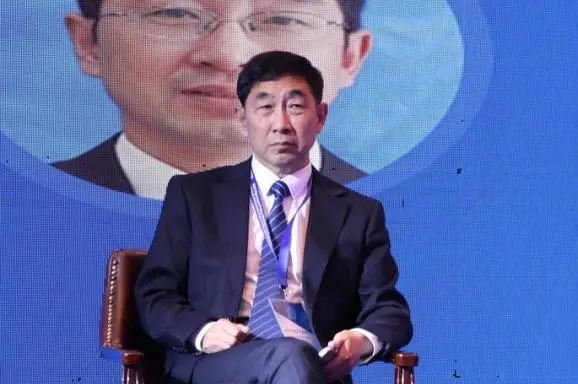
Mr. ZHOU Huichun, Assistant President, Tangshan Maritime Institute, China
Advancing Learning and
Innovation in Technical and
Vocational Education and
Training (TVET)
Session IV was chaired by Ms. TUNGALAG Chimid, Executive Director, Vocational Education and Training Partnership (UNESCO-UNEVOC Centre in Mongolia).
Dr. PARK Hwa Choon, Director of the Center for International Cooperation at the Korea Research Institute for Vocational Education and Training in Republic of Korea, shared Korea's AI-driven TVET innovation practices, particularly highlighting the "K-Digital Training" programme that provides AI skills training for both youth and mid-career job seekers. Dr. PARK particularly emphasised that multi-stakeholder collaboration is key to promoting the global alignment of AI and TVET in terms of policy, ethics, and practice.
Ms. BAYARMAA Tsogtbaatar, Director of the Institute of Engineering and Technology of Mongolia, presented her institution's experiences and challenges in applying AI tools such as ChatGPT, Grammarly, and AutoCAD AI plugins in teaching. She showcased significant achievements from the use of AI-based virtual labs for electrical systems and other AI tools in the classroom. She noted that partnerships with domestic and international enterprises and higher education institutions have not only facilitated better alignment between curricula and industry needs but also supported the development of a more inclusive and sustainable digital TVET ecosystem.
Relevant China's vocational education stakeholders education sector also shared a range of innovative outcomes.
Mr. WANG Mingzhe, Director of the Academic Affairs Office and Dean of the School of Aeronautics and Astronautics at Caofeidian College of Technology in China, introduced practical cases where the Superstar Generative AI platform and virtual simulation training platforms were leveraged to enhance teaching efficiency.
Ms. WANG Yufei, Assistant to President and Head of Overseas Business Department at Jiangxi KMAX Industrial Co. Ltd. in China, focused on the application results of the "AI + VR Culinary Education System" and the "AI Artisan Assistant" platform in higher education institutions. She emphasised that transforming industry knowledge into standardised technical models is a key pathway for the dissemination of innovative outcomes.
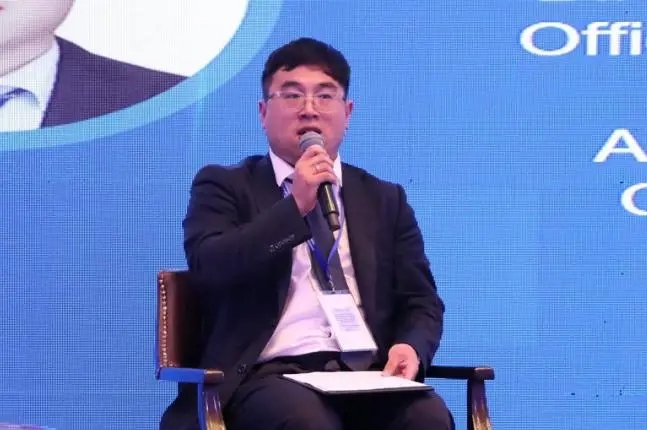
Mr. WANG Mingzhe, Director of the Academic Affairs Office and Dean of the School of Aeronautics and Astronautics at Caofeidian College of Technology, China
Enterprise Solution
Demonstration: Innovative
application of AI to
drive higher education
transformation
UNESCO-ICHEI and the co-organisers built a platform to invite representatives from East Asian technology companies to gather and focus on their cutting-edge solutions in supporting the digital transformation of higher education. Representatives from China's Wisdom Garden, WPS Software, and Guangzhou Dazzleview Intelligent Technology, Mongolia's Chimege Systems LLC, and South Korea's Soongsil University demonstrated regionally-specific digital education solutions around the core topics of smart teaching, personalised learning, and educational equity.
Wisdom Garden took its integrated platform TronClass AIR as an example, showing how to solve the problem of fragmentation in the use of AI tools in universities, and improve the efficiency of teaching collaboration. WPS Software launched the "WPS AI" platform for the education scenario. The platform automates the generation of teaching materials through document cognition, simplifies the educational office process, and effectively helps teachers to improve quality and reduce the burden. Guangzhou Dazzleview Intelligent Technology focused on the Smart Classroom and AI course co-construction solutions, combined with self-developed operating system and AIGC platform, and UNESCO-ICHEI in cooperation with a number of Asian and African countries to achieve the landing of colleges and universities. Chimege Systems LLC in Mongolia launched an AI teacher platform and a localised large language model "Egune", which supports personalised learning, mental health analysis and multilingual subtitling services, helping to effectively alleviate the problem of teacher shortage and improve accessibility to education in remote and multilingual areas. South Korea's Soongsil University demonstrated its AI-based Multiple Intelligences Test (AI-MIT), which helps students identify their individual strengths and match them with career paths, providing data support for personalised growth and teaching adjustments.
Closing Remarks
The dialogue concluded with closing remarks from representatives of the three co-organising institutions. Dr. CHOI Mee Young, Chief of Education at the UNESCO Beijing Office, delivered heartfelt appreciation to all participants, organisers, and supporting institutions, with special recognition for the speakers' insights. She challenged attendees to continue reflecting on the fundamental question: "What is AI transformation?" Dr. Choi emphasised that while international organisations, governments, universities, and enterprises each bring unique strengths to regional AI transformation, success depends on their close collaboration. She issued a strong call for continued strengthening of international cooperation in this vital area.
Ms. BI Xiaohan, Deputy Director of UNESCO-ICHEI, thanked speakers and participants for sharing policy insights and best practices on integrating AI with higher education. She stated that UNESCO-ICHEI will continue to promote the practical application of AI technology in higher education through hosting conferences and publishing reports to facilitate experience exchange and knowledge sharing. She looks forward to the emergence of more innovative practices integrating AI with higher education in the future, working together to advance the process of educational digital transformation.
Mr. BOLDSAIKHAN Sambuu, Secretary-General of the Mongolian National Commission for UNESCO, expressed gratitude to UNESCO and UNESCO-ICHEI for their coordination efforts. He noted that the dialogue successfully showcased Mongolia's growing influence in the region's digital transformation landscape and reaffirmed the country's commitment to enhancing digital literacy and capacity building within higher education institutions. Mr. Boldsaikhan emphasised his anticipation for future exchanges, joint research initiatives, and collaborative projects.
This Policy Dialogue served as a catalyst for bringing together diverse stakeholders across East Asia's higher and vocational education sectors to unlock new possibilities for AI technology implementation. Through multilateral policy discussions and practice-sharing mechanisms, participants explored cutting-edge application scenarios and identified development potential for AI transformation across the region. Looking ahead, UNESCO-ICHEI will deepen its multilateral collaboration with East Asia and beyond to empower higher education institution professionals through the IIOE Micro-Certification Project for Enhancing Digital and AI Competencies of University Teachers, promote continuous upskilling and reskilling initiatives, and contribute to the digital transformation of higher education.

